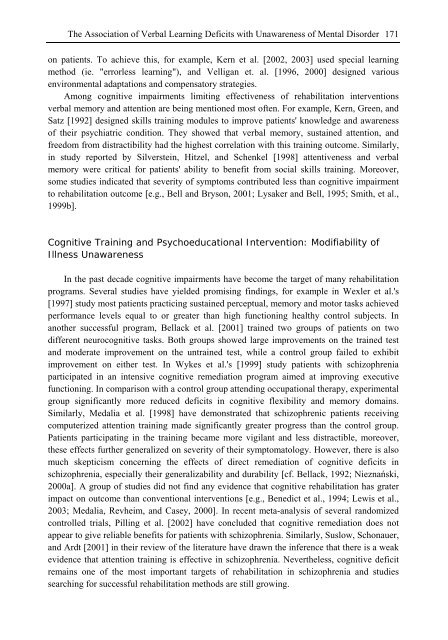Schizophrenia Research Trends
Schizophrenia Research Trends
Schizophrenia Research Trends
- No tags were found...
Create successful ePaper yourself
Turn your PDF publications into a flip-book with our unique Google optimized e-Paper software.
The Association of Verbal Learning Deficits with Unawareness of Mental Disorder 171on patients. To achieve this, for example, Kern et al. [2002, 2003] used special learningmethod (ie. "errorless learning"), and Velligan et. al. [1996, 2000] designed variousenvironmental adaptations and compensatory strategies.Among cognitive impairments limiting effectiveness of rehabilitation interventionsverbal memory and attention are being mentioned most often. For example, Kern, Green, andSatz [1992] designed skills training modules to improve patients' knowledge and awarenessof their psychiatric condition. They showed that verbal memory, sustained attention, andfreedom from distractibility had the highest correlation with this training outcome. Similarly,in study reported by Silverstein, Hitzel, and Schenkel [1998] attentiveness and verbalmemory were critical for patients' ability to benefit from social skills training. Moreover,some studies indicated that severity of symptoms contributed less than cognitive impairmentto rehabilitation outcome [e.g., Bell and Bryson, 2001; Lysaker and Bell, 1995; Smith, et al.,1999b].Cognitive Training and Psychoeducational Intervention: Modifiability ofIllness UnawarenessIn the past decade cognitive impairments have become the target of many rehabilitationprograms. Several studies have yielded promising findings, for example in Wexler et al.'s[1997] study most patients practicing sustained perceptual, memory and motor tasks achievedperformance levels equal to or greater than high functioning healthy control subjects. Inanother successful program, Bellack et al. [2001] trained two groups of patients on twodifferent neurocognitive tasks. Both groups showed large improvements on the trained testand moderate improvement on the untrained test, while a control group failed to exhibitimprovement on either test. In Wykes et al.'s [1999] study patients with schizophreniaparticipated in an intensive cognitive remediation program aimed at improving executivefunctioning. In comparison with a control group attending occupational therapy, experimentalgroup significantly more reduced deficits in cognitive flexibility and memory domains.Similarly, Medalia et al. [1998] have demonstrated that schizophrenic patients receivingcomputerized attention training made significantly greater progress than the control group.Patients participating in the training became more vigilant and less distractible, moreover,these effects further generalized on severity of their symptomatology. However, there is alsomuch skepticism concerning the effects of direct remediation of cognitive deficits inschizophrenia, especially their generalizability and durability [cf. Bellack, 1992; Nieznański,2000a]. A group of studies did not find any evidence that cognitive rehabilitation has graterimpact on outcome than conventional interventions [e.g., Benedict et al., 1994; Lewis et al.,2003; Medalia, Revheim, and Casey, 2000]. In recent meta-analysis of several randomizedcontrolled trials, Pilling et al. [2002] have concluded that cognitive remediation does notappear to give reliable benefits for patients with schizophrenia. Similarly, Suslow, Schonauer,and Ardt [2001] in their review of the literature have drawn the inference that there is a weakevidence that attention training is effective in schizophrenia. Nevertheless, cognitive deficitremains one of the most important targets of rehabilitation in schizophrenia and studiessearching for successful rehabilitation methods are still growing.
















